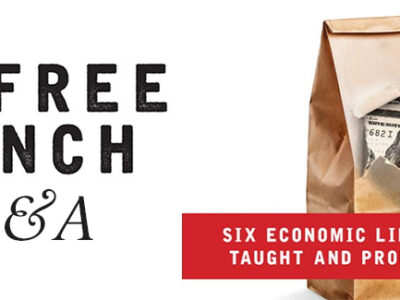The case for free trade rests on a simple principle: people should be free to buy from whomever they choose, even if the supplier is a foreigner. The opponents of free trade believe that there are legitimate exceptions to this principle. When foreign businesses have an allegedly “unfair” advantage, Americans competing against them want Uncle Sam to rescue them by adopting protectionist policies, such as import quotas and tariffs. They want the government to “level the playing field.” They fear losing their jobs, and/or they are afraid that free trade will result in the economic decline of our country. The first concern is valid; the second is not.
In this article, I will address the economics, ethics, and politics of the first concern—that of specific American jobs being lost to foreign competitors. A follow-up article will address the larger issue of whether free trade is bad for America.
It is an economic fact of life that, in a competitive marketplace, less efficient (i.e., higher-cost) producers are replaced by more efficient (lower-cost) producers. To the economist, it is irrelevant whether the lower-cost producer is domestic or foreign—the American standard of living is inevitably benefited when Americans can buy more for less. However, the domestic businesses threatened by foreign competition aren’t so sanguine about this point. When the competitors underselling them are foreigners, they appeal to nationalistic sentiments and lobby for government protection from this allegedly unfair competition.
It is important to understand that a domestic company’s competitive disadvantage may be self-inflicted. For example, from 1975 through 1982, employment costs in the domestic steel industry rose from $9 per hour to $24 per hour. During this time, the number of steel workers decreased from 500,000 to 300,000. In 1982, Japanese steel workers were paid only half what their American counterparts received, yet had greater productivity. This suggests that many American steel workers priced themselves out of their jobs rather than losing them to unfair competition.
Nevertheless, there are times when foreign companies receive subsidies from their governments, enabling them to undersell American producers. The economist readily concedes that subsidies are unfair, but maintains that domestic protectionist policies aren’t fair either, nor do they make economic sense. Two wrongs don’t make a right. Just because a foreign government has imposed an unfair burden on its own people by taxing them to lower the prices of favored products doesn’t mean that our government should respond by imposing an unfair burden on Americans. Why should Uncle Sam deny Americans access to the cheaper prices that are available to everyone else? What is fair about that? Do higher prices increase the prosperity of a people? If foreign governments wish to export wealth in the form of lower prices to U.S. citizens, we should accept such generosity.
Here is where the protectionists play their trump card. “Look, Hendrickson, the key point is this: if we don’t adopt protectionist policies, American jobs will be lost.” This is true; however, it is equally true that protectionist policies themselves will cause Americans to lose jobs. Using the steel industry as an example again, every time Uncle Sam has restricted the importation of cheaper steel, the many American businesses that use steel as an input have been placed at a competitive disadvantage. Their foreign competitors can purchase this important input for less, and thus charge lower prices for their finished products. Indeed, the evidence shows that every time protectionist measures have been granted to domestic steel companies, more American jobs are lost in steel-using industries than are saved in steel-producing firms. Thus, protectionism, in practice, doesn’t save American jobs on a net basis, but merely sacrifices some jobs to protect others. Clearly, protectionist policies don’t produce the “level playing field” that protectionists claim to favor.
Here is an analogy: a ship is about to sink; the only lifeboat is filled with twelve small passengers; then, eight large passengers persuade the ship’s officers to remove the twelve small passengers from the lifeboat—dooming them—so that the eight large passengers may have their places. That is the reality of protectionism. Look, I’m not knocking the survival instinct, but let’s drop the pretense that such actions restore “justice” or “fairness.”
To the economist, one job has no more an inherent right to government protection than any other job; however, the most important job in the world to most people is the one they hold, and if they think they can convince the national government to protect their jobs, they will try. However, this same government stands idly by when millions of other American jobs come to an end. Why should politicians deem certain jobs “special” and worthy of government support that isn’t available to most Americans? There is no ethical principle underlying such arbitrary and inconsistent intervention; rather, it is the exercise of raw political power. Protectionism, unlike free trade, confers a privileged political status on a minority of workers, thereby violating the first principle of justice: equality before the law.
In sum, protectionism makes our country poorer, while free trade makes us richer; protectionism’s inefficiencies reduce employment, while free trade’s efficiencies increase employment; protectionism curtails individual liberty, while free trade is an expression of liberty; protectionism corrupts justice, while free trade enshrines equality before the law. Free trade is no panacea, but I’ll take it over protectionism any day.



